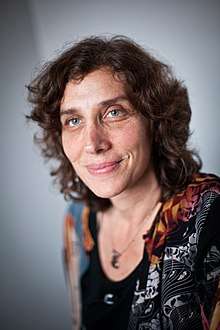Laura Stachel
Laura Stachel is a former medical doctor who founded and leads We Care Solar, a nonprofit that manufactures solar electric systems the size of a suitcase for use in medical clinics in the developing world. She is also the mother of actor and singer Ari'el Stachel.

Education and early life
Laura Stachel was brought up in the Boston area.[1] She earned her undergraduate degree at Oberlin College, earned her medical degree at University of California, San Francisco in 1985, and in 2006 earned a master's in public health from UC Berkeley.[2]
Career
Stachel practiced as an ob/gyn doctor after finishing medical school, but in 2002 pain from degeneration in the vertebrae in her neck forced her to quit delivering babies and eventually to leave clinical medicine. She went back to school to earn a masters in public health and began lecturing at UC Berkeley. In 2008, while studying for her doctorate, she traveled to Nigeria to study what rates of maternal mortality were so high. During that time she witnessed how lack of electricity directly affected health outcomes for women and infants during childbirth.[3][4]
Her husband, Hal Aronson, was creating solar education programs in the San Francisco Bay area. She asked if he could design a system that would target areas of the Nigerian hospital most important for maternal health. The solar electric system he created for the maternity ward, labor room, operating theater, and laboratory, helped the hospital achieve a 70% drop in maternal mortality the next year. Surrounding clinics began to ask for solar power, and Hal designed solar power for ob/gyn clinics in the developing world.[5] Aronson designed a system the size of a suitcase to allow Laura to transport these to Africa. The Solar Suitcase had solar panels to be removed and mounted on the roof, a charge controller, a 12-volt battery, LED lights, and multiple outlets; the "Solar Suitcase" was eventually further developed to include phone chargers, a fetal monitor, and customized long-lasting LED lights.[3] Stachel brought the first one back to Nigeria in 2009 and the clinic asked to keep it.[3] Hal and Laura received further help from an engineer, Brent Moellenberg, and support from Bay area solar companies Everbright Solar and Holly Solar Products, to perfect the design and work out the manufacturing.[6]
The couple established a nonprofit, We Care Solar (formally WE CARE — an acronym for Women's Emergency Communication and Reliable Electricity),[7] and it received its IRS nonprofit ruling in 2011.[8] The couple at first built the solar devices in their garage and backyard. They sought ways to fund it; Stachel competed in a technology for social good competition in 2009, earning only an "honorable mention," but one of the judges connected them with the Blum Center for Developing Economies at UC Berkeley which provided the nonprofit with office space and financial support.[4]
In 2010 the nonprofit received an order from WHO for 20 devices in clinics in Liberia, and received a grant from the MacArthur Foundation, allowing them pilot Solar Suitcases in Nigeria and Uganda and to hire an engineer. Stachel entered several more social entrepreneurship business competitions and received mentoring and scholarships to understand how to run nonprofit. Over the next few years, We Care Solar built a team of finance, programmatic, and engineering staff. By 2019, according to Stachel, there were more than 4,000 Solar Suitcases installed in more than 20 countries, and We Care Solar had worked with 45 other NGOs and UN agencies to serve more than 1.9 million mothers.[4][9]
References
- Pine, Dan (25 January 2013). "Power to the people: Berkeley couple brings light to clinics in developing nations". J Weekly.
- "Laura Stachel". LinkedIn. Retrieved 10 May 2018.
- Humphreys, G. (2014-02-01). "Harnessing Africa's untapped solar energy potential for health". Bulletin of the World Health Organization. 92 (2): 82–83. doi:10.2471/blt.14.020214. PMC 3949541. PMID 24623899.
- Sharma, Seema (July 12, 2017). "UN Sustainable Development Goals: Saving lives through solar innovation - Interview with Dr Laura Stachel". Mendeley Careers.
- Townsend, Peggy (October 15, 2012). "Alumni Profile / Hal Aronson: Shining a light on women's health". UC Santa Cruz News.
- Taylor, Tracey (16 April 2012). "From a Berkeley garage, a solar initiative that saves lives". Berkeleyside.
- Rufus, Anneli Star Josselin (March 2, 2011). "Saving Mothers With Laura Stachel". East Bay Express.
- "We Care Solar Inc". GuideStar. Retrieved 10 May 2018.
- interview with Laura Stachel, Nov 3, 2019